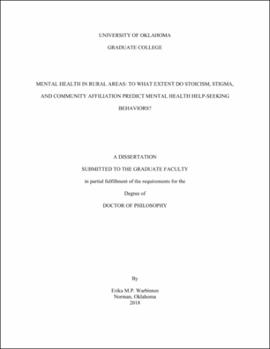| dc.description.abstract | This study sought to explore the relationship between stoicism, stigma, and community affiliation on mental health help-seeking behaviors within rural communities. A relationship between mental health stigma and decreased mental health help-seeking behaviors has been established among both rural and urban communities, however, it is known that mental health stigma is increased in rural communities (Smalley & Warren, 2012a; Smalley & Warren, 2012b; Cantrell, Valley-Gray, Cash, 2012; Larson, Corrigan, & Cothran, 2012; Middleton, et al., 2003). The concept of stoicism has been studied within medical and philosophical literature (Murray et al., 2008), identifying that people who espouse more stoic attitudes are less likely to seek help for physical health reasons. However, there has been little, if any, focus on the impact that stoic attitudes have on mental health help-seeking, and certainly not in the rural United States. The third predictor variable, community affiliation, is comprised of the concepts of community attachment and community involvement, and is a new term that was utilized in the present study. The term affiliation highlights the concept of social connectedness, alliance, fellowship, and ownership that community attachment and community involvement do not embody. The current study explored (a) to what extent do the predictor variables of stoicism, stigma, and community affiliation predict mental health help-seeking behaviors in rural communities; and (b) which predictor variable accounted for the most variance when entered into the hierarchical regression model. While all predictor variables were found to be significant during the preliminary linear regression analyses stage, during the multiple regression analysis, stoicism emerged as the most significant predictor of decreased mental health help-seeking, followed by stigma. Conversely, community affiliation became non-significant when entered into the total multiple regression model. | en_US |
